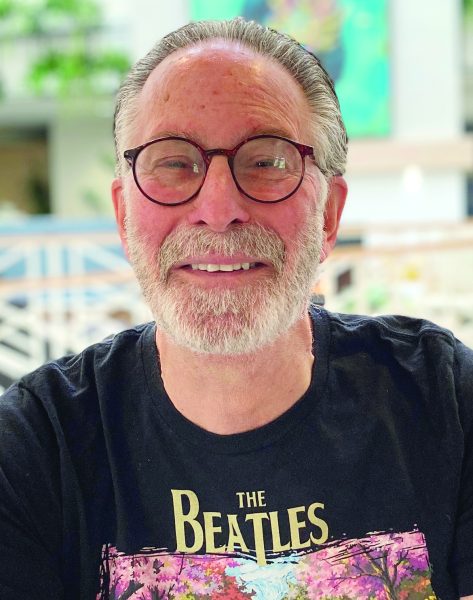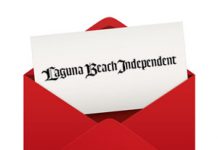By Denny Freidenrich
 Former President Barack Obama was too young to remember the watershed event, but I’m sure if you ask Joe Biden, Donald Trump, George Bush, or Bill Clinton, they all could tell you where they were the night the Beatles first appeared on “The Ed Sullivan Show” 60 years ago.
Former President Barack Obama was too young to remember the watershed event, but I’m sure if you ask Joe Biden, Donald Trump, George Bush, or Bill Clinton, they all could tell you where they were the night the Beatles first appeared on “The Ed Sullivan Show” 60 years ago.
That’s not to discount other historical events of the 1960s, such as the Kennedy assassination, the Vietnam War, or the moon landing. But when John, Paul, George and Ringo first belted out their songs on American soil, I’ll bet you a dozen electoral college votes everything changed for all the future presidents that night, just as everything changed for me.
Sunday night, Feb. 9, 1964, an estimated 73 million of us — an astonishing 40 percent of the available audience, equal to around 125 million in today’s viewership — watched four English lads pound musical history into our lives. The Beatles had arrived, and with them came a sense of joy — “Yeah, yeah, yeah” — and relief. Only ten weeks earlier, we had been mourning the murder of JFK.
Before the Beatles’ invasion, teenage boys sported closely cropped hair; our favorite bands included the Everly Brothers and the Beach Boys, and we were still getting used to Lyndon Johnson.
Suddenly, none of that mattered.
By Monday morning, change was in the air. Many of us headed off to school that day, having decided to let our hair grow longer. “I Want to Hold Your Hand” was rocking the charts, and few paid attention to the new president. Sociologists said this phenomenon would pass in a few months. Wow, were they wrong.
Within a year, sideburns were bushy, Beatles paraphernalia had flooded the marketplace, and that war with few heroes quietly advanced. By the time I graduated from high school in 1966, I was a self-appointed Beatles know-it-all (“The real meaning behind the banned record cover is …”) and a troubled believer in Vietnam. With the release of “Eleanor Rigby,” social commentary played an ever-increasing role in their music.
Four years at USC proved challenging yet disillusioning. The Beatles introduced their magical mystery tour as the nightly news simultaneously broadcasted the horrors of Indochina into our homes. Beards soon replaced sideburns and campus riots replaced sock-hops. Songs like “Give Peace a Chance” and “Hey Jude” weren’t simply mega-hits; they were America’s new national anthems. Like Bill C., George W., The Donald and Joe, I avoided fighting in Vietnam (despite being selected first in the 1969 draft lottery).
These were changes that, if you were twentysomething back then, you spent much of your time absorbing or avoiding. I don’t know which of these the current and former presidents embraced. All I know is the changes were real for me and my generation.
Initially, John, Paul, George and Ringo personified baby boomers’ brightest hopes. The Beatles bridged the gap between black and white and young and old. Through them, suburbia discovered drugs, and the Boston Pops discovered rock’ n’ roll. Toward the end of their run, the idyllic images turned to nightmares, much as “Michelle” gave way to “Lucy in the Sky with Diamonds.”
Some music experts claim the Beatles were responsible for widening the intellectual boundaries of rock, thus making it a more flexible and acceptable art form. I am not smart enough to know whether this is true or not. But I know how music changed, and you can hear it in almost every song out today.
No one can turn back the clock, so trying to “get back to where you once belonged” is futile.
As the late, great P.J. O’Rourke once wrote in Time Magazine, “The majority of Americans alive today hadn’t been born yet in the 1960s. But we of a certain age (the age that grips levers of power, pulls strings of purse and has the biggest mouth) can’t stop reliving each moment.
“Partly it’s the poignancy of the decade. It started so well. Handsome young couple in the White House, recovery from the 1960 recession, the Pill, upbeat message movies like ‘101 Dalmations’ and ‘Spartacus,’ Hugh Hefner’s illuminating ‘Playboy philosophy’ and the clean-cut Kingston Trio leading sing-alongs in short-sleeve shirts with big, wide, cheerful stripes.
“Then it went so wrong. Shooting and killing, and troops in combat gear, not only in Watts and Detroit but all the way over in Khe Sanh, South Vietnam. Feminists were suddenly angry for some, as far as men could tell, feminine reason. I had to maintain a C average to avoid the draft. Turns out you can’t fly after you take LSD. There was a war on poverty. We lost. And it rained at Woodstock.”
All true, P.J., but those changes in ourselves and in our world are what we have in common. They are what the Beatles symbolized for me, future presidents and for us all.
Longtime Laguna resident Denny Freidenrich was 15 years old when the Beatles arrived in America.




